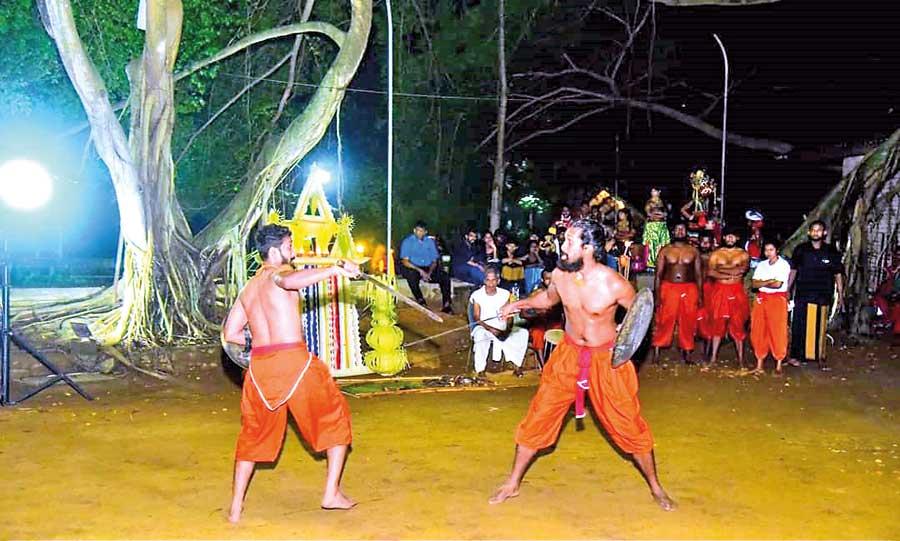30 Dec 2022 - {{hitsCtrl.values.hits}}

Intending to promote Sri Lankan tourism at a time when Sri Lanka is facing a dollar crunch due to the country’s worst socio-economic crisis since independence in 1948, the Japura tourism and the undergraduates of the Buddhist Heritage and Tourism degree programme offered by the Department of Pali and Buddhist Studies of the Faculty of Humanities and Social Sciences of University of Sri Jayewardenepura recently organised a cultural concert. Under the title “Seehabhimani’ 22”, the concert was held on December 9 at 6 PM at the Bandaranaike Memorial International Conference Hall (BMICH) to showcase the Sri Lankan cultural heritage to the world and promote Sri Lankan tourism. Foreign tourists and other tourism stakeholders participated in the concert.
tourism and the undergraduates of the Buddhist Heritage and Tourism degree programme offered by the Department of Pali and Buddhist Studies of the Faculty of Humanities and Social Sciences of University of Sri Jayewardenepura recently organised a cultural concert. Under the title “Seehabhimani’ 22”, the concert was held on December 9 at 6 PM at the Bandaranaike Memorial International Conference Hall (BMICH) to showcase the Sri Lankan cultural heritage to the world and promote Sri Lankan tourism. Foreign tourists and other tourism stakeholders participated in the concert.
Sri Lanka Tourism Promotion Bureau (SLTPB), FRELLA -Artistry in Beauty & Wellness, Sri Lanka Army, LAYA Hotels and Fadna sponsored the event. As the chief guest of the event, the Chairman of the SLTPB, Chalaka Gajabahu said at a time like this, the cultural programme could make a greater impact on taking Sri Lanka, as a tourist destination, to a global platform and thereby attract thousands of tourists to the country.
Japura tourism
Speaking to the Daily Mirror, Prof. Dunesh Gunathilake of the Department of Buddhist and Pali Studies said the concert comprised cultural performances ranging from traditional dancing to authentic local martial arts like ‘Angampora’. He also noted the concert came under the spotlight of many tourism stakeholders who were into promoting cultural and heritage tourism. “We need similar concerts and cultural events to promote Sri Lanka at a time when tourism is suffering the worst due to the economic crisis.”
Explaining the importance of the Bachelor of Arts degree programme in Buddhist Heritage and Tourism, which first started in 2020, Prof. Gunathilake said there were many foreign tourists who visited Sri Lanka for its cultural and heritage value. He said, “In such a context, I thought a degree that could boost and promote such places of cultural and heritage value could largely contribute to the country’s economy. We can tap this potential area of tourism. He said the Faculty’s Dean Prof. Shirantha Heenkenda had also relentlessly worked to get approval from the University Grant Commission to commence the degree programme.
Identifying the importance of including foreign languages in the degree programme, Prof. Gunathilake said, “In addition to subject knowledge, the degree programme also offers language courses such as Chinese, Japanese, Russian and French. This gives the students the skills necessary to find job opportunities that are in demand in the field of tourism and hospitality management. In collaboration with the Sri Lanka Tourism Development Authority and other notable travel agencies and hotels, we have had several programmes over the years since the first batch of students was enrolled on the degree programme.”
Prof. Gunathilake said there was a lack of expertise and comprehensive knowledge in the tourism field in Sri Lanka about heritage sites, adding that the degree programme could prepare students to enter the job market as efficient and productive graduates.
Speaking to the Daily Mirror lecturer of the department of Buddhist and Pali Studies, Charith Mudalige said that the Bachelor of Arts degree programme in Buddhist Heritage and Tourism equipped the students with vital skills necessary for the tourism industry. He said it not only provided the students with theoretical knowledge about tourism but it also ensured that the students gained many opportunities to engage with the tourism stakeholders to get more exposure to the industry.
“We value novel ideas and one such idea is promoting cave tourism. We have started to research caves located all over the country and we are planning to establish a strategy to promote cave tourism,” Mr. Mudalige said. According to him, this could attract many tourists from Asian, European and other western countries. He said, “New sources of income generation in terms of dollar earnings are necessary to pull the country out of this socio-economic crisis. This is not an easy task but daunting. Therefore, we focus our attention on other avenues of income-generation methods in the field of tourism. This is what prompted us to come up with the novel tourism concept—“cave tourism”. This could specifically attract a large number of tourists who are interested in the culture and heritage in Sri Lanka.”
25 Nov 2024 11 minute ago
25 Nov 2024 1 hours ago
25 Nov 2024 1 hours ago
25 Nov 2024 2 hours ago
25 Nov 2024 2 hours ago